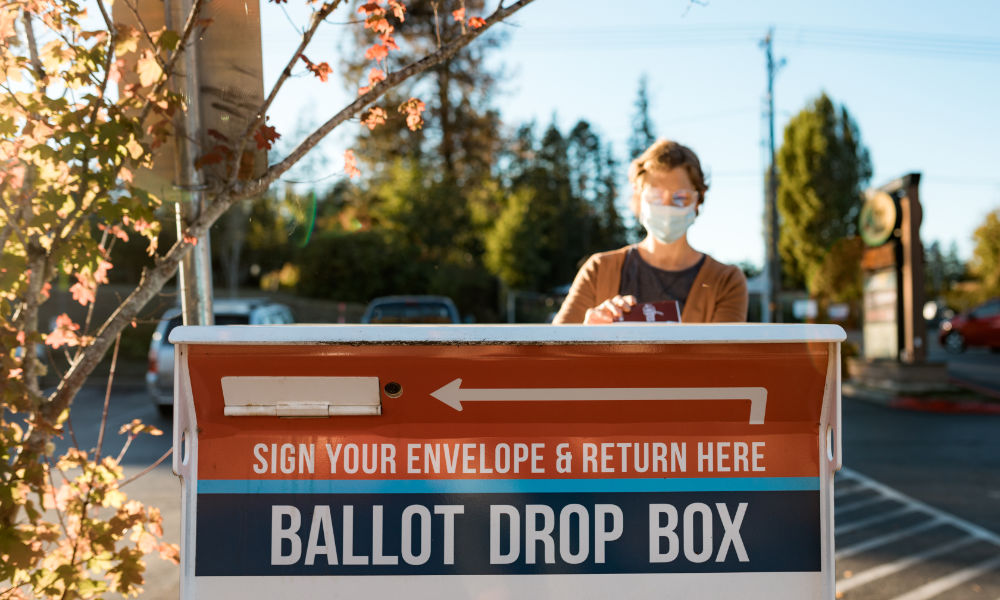
On the eve of the November 3 election, Bright Line Watch–the political science research project of faculty at the University of Rochester, the University of Chicago, and Dartmouth College–finds that experts are concerned about substantial risks to the legitimacy of the election, including potential problems in the casting and counting of votes, the Electoral College, and in the resolution of electoral disputes.
Meanwhile, among the US public surveyed, a majority of those who support Trump–as well as a plurality of those who oppose him–believe voter fraud to be far more prevalent than the evidence shows.
These are among the findings of the watchdog group’s latest (October 2020) surveys.
“It’s really disconcerting that the myth of voter fraud is so broadly accepted,” says Gretchen Helmke, professor of political science at Rochester and one of the founders of Bright Line Watch. “There is absolutely no systematic evidence to support any of the various claims made about widespread voter fraud, yet more than three quarters of Trump supporters continue to believe that this is a real danger, as do more than 20 percent of Trump opponents.”
Helmke says that this myth has long been used as a pretext for laws that suppress votes. “In the short run,” she adds, “it also potentially allows Trump to sow doubt and chaos about any election results that do not go his way.”
The group’s immediate past survey, released in August, found the health of democracy in the United States at its lowest point since Bright Line Watch began tracking its performance in 2017.
As they had done before, the group fielded two separate surveys in October: one to political experts and one to a representative sample of the US population.
As in previous surveys, the team asked each group to assess the quality of US democracy overall and to rate the performance on 30 distinct democratic principles. Additionally, the Bright Line Watch team asked the experts to rate the likelihood of 28 election scenarios that could produce political crises, while they polled the public about the legitimacy of different 2020 election results, their confidence that votes will be counted fairly, their beliefs about voter fraud, and their willingness to tolerate political violence.

Key findings
- The experts anticipate a flood of online misinformation and potentially destabilizing rhetoric from President Trump during and after November 3.
- The experts see substantial risks of scenarios that could threaten the election, including potential problems in the casting and counting of votes, the Electoral College, and in the resolution of electoral disputes.
- The experts rate President Trump’s statement that the 2020 election should be delayed and his refusal to commit to a peaceful transfer of power as the most important and abnormal of the 169 events they have rated over the course of his presidency.
- Americans are generally confident their votes will be counted as intended at the local level and as voters intend in their states, but somewhat less confident in the process at the national level.
- Only 44 percent of Trump supporters say they would regard a Biden victory as legitimate and only 34 percent of Trump opponents said they would view a Trump victory as legitimate.
- Both supporters and opponents of President Trump recognize that the election result may not be clear on November 3. Majorities of both groups say they are prepared to recognize outcomes that differ from the initial count on election night as legitimate.
- Trump’s supporters and opponents have starkly different beliefs about the prevalence of voter fraud in US elections.
- Most Americans, regardless of political affiliation, reject the use of violence to advance political goals, but substantial minorities are willing to condone violence and incivility.
- Americans’ confidence that their government protects them from political violence and guarantees their right to peaceful protest has declined since March.
The result of their survey of the American public shows a clear partisan divide over the allegation of possible voter fraud: the percentage of Americans who believe that thousands of each type of illegal votes are cast in elections ranges from 41 to 50 percent overall. However, it never rises above 29 percent among those who disapprove of President Trump, whereas the percentages range from 67 percent (voting more than once) to 78 percent (non-US citizens voting or stealing or tampering with ballots) among Americans who approve of Trump.
2020 election nightmare scenarios
The team asked the experts to rate the likelihood of a catalogue of potential crises scenarios.
The scenarios rated as most likely concern potential problems on Election Day, such as widespread false claims on social media about the integrity of the election, and misleading reports about long lines and delays at the polls.
The experts also ranked near the top several items directly related to President Trump–that he would decry as false an anticipated “blue shift” as mail-in ballots are counted and instead insist that the initial totals on election night were correct; that he would encourage violence and intimidation during voting or ballot counting; and that he would refuse to concede the 2020 election after having been declared to have lost by the Associated Press.
Bright Line Watch’s experts also predicted that the disqualification of mail-in ballots will surpass 5 percent in at least one state, that early vote counts, which are expected to underrepresent mail ballots, will lean Republican, and that at least one candidate will declare victory before the Associated Press regards the outcome as sealed.
“Our experts rate President Trump’s discussion of delaying the election and refusal to commit to the peaceful transfer of power as the most important and abnormal of his presidency,” says Brendan Nyhan, professor of government at Dartmouth College, and one of the founders of Bright Line Watch. “This finding reinforces the need for concern about democratic stability in this election and in the future.”

